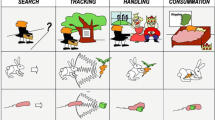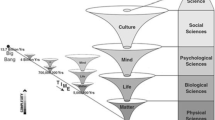Abstract
The traditional, and still quite accepted, view of psychological phenomena (e.g., emotions, moods, “propositional attitudes”) holds that they are inner entities of some non-behavioral sort (reducible or not to brain phenomena) that bring about behaviors. Behavioral and related externalist perspectives, on the other hand, oppose (in different ways) this view. There is controversy, however, over how to understand psychological phenomena giving prominence to behaviors. Most versions of the so-called extended mind view, for instance, are very different from behavioral perspectives. This paper aims at contributing to this discussion by outlining a behavioral approach that draws upon Ryle and Skinner, among others. According to this approach, psychological phenomena of different categories are by and large made up of overt and/or covert behaviors and their relations to the environment. This paper starts off by briefly surveying the range of psychological categories and identifying a desideratum for an account thereof, according to which the account should, in general, be consistent with the basic nuances of these categories. It is suggested that the outlined approach fares well in this respect and is virtuously (as opposed to viciously) parsimonious. Also, Rachlin's teleological behaviorism and Clark and Chalmers' extended mind view are very briefly discussed.
Similar content being viewed by others
Notes
The terminology of 'cognitive processes' used here is simply a convenient label. As will become clear later on, I am not relying upon any assumptions distinctive of the cognitivist tradition.
I do not understand covert behavior as behavior observable uniquely from (or accessible to) the organism's own vantage point. Rather, I understand it as behavior largely unobservable by simple consideration of what is going on outside the organism's skin, exoskeleton or the like.
I say 'at least partially' not to rule out the participation of non-selective (or neutral) processes in their etiology (e.g., genetic drift in phylogeny and its analogous in the ontogeny of behavior). On this, see Cleaveland (2002).
The view here outlined is nevertheless different from those of Ryle and Rachlin. For example, I consider that covert behaviors make up some instances of psychological phenomena, whereas Rachlin does not. My view is perhaps largely in continuity with Ryle's, but I work with a more detailed characterization of behaviors.
Some authors believe that, like propositional attitudes, these affections have an episodic character in some cases. My previous remark upon supposed episodic propositional attitudes applies analogously here.
The well-known holistic objection to behavioral accounts is no threat to the account here outlined. For one reason, this objection is question-begging, since it assumes that psychological phenomena are non-behavioral inner things that cause behavior. Also, it assumes that such accounts intend to reduce ascriptions of psychological phenomena to ascriptions of behavior without introducing mention to psychological phenomena (Lazzeri & Oliveira-Castro 2010).
References
Bedford, E. (1957). Emotions. Proceedings of the Aristotelian Society, 57, 281–304.
Bennett, M. R., & Hacker, P. M. (2003). Philosophical foundations of neuroscience. Oxford: Blackwell.
Braddon-Mitchell, D., & Jackson, F. (2007). Philosophy of mind and cognition (2nd ed.). Oxford: Blackwell.
Burge, T. (1979). Individualism and the mental. Midwest Studies in Philosophy, 4, 73–121. doi:10.1111/j.1475-4975.1979.tb00374.x.
Catania, A. C. (2012). Learning (5th ed.). Cornwall-on-Hudson, NY: Sloan.
Catania, A. C. (2013). A natural science of behavior. Review of General Psychology, 17, 133–139. doi:10.1037/a0033026.
Chalmers, D. J. (1995). Facing up to the problem of consciousness. Journal of Consciousness Studies, 2, 200–219.
Charles, E. P., Bybee, M. D., & Thompson, N. S. (2011). A behaviorist account of emotions and feelings: Making sense of James D. Laird's Feelings: The perception of self. Behavior and Philosophy, 39, 1–16.
Clark, A. (2008). Supersizing the mind. New York: Oxford University Press.
Clark, A., & Chalmers, D. J. (1998). The extended mind. Analysis, 58, 7–19. doi:10.1093/analys/58.1.7.
Cleaveland, J. M. (2002). Beyond trial-and-error in a selectionist psychology. Behavior and Philosophy, 30, 73–99.
Davidson, D. (1987). Knowing one’s own mind. Proceedings and Addresses of the American Philosophical Association, 60, 441–458.
Donahoe, J., & Palmer, D. C. (1994). Learning and complex behavior. Boston: Allyn and Bacon.
Epstein, R., Kirshnit, C. E., Lanza, R. P., & Rubin, L. C. (1984). 'Insight' in the pigeon: Antecedents and determinants of intelligent performance. Nature, 308, 61–62. doi:10.1038/308061a0.
Fodor, J. A. (1968). Psychological explanation. New York: Random House.
Fodor, J. A. (1980). Methodological solipsism considered as a research strategy in cognitive psychology. Behavioral and Brain Sciences, 3, 63–109. doi:10.1017/S0140525X00001771.
Genone, J. R. (2011). Appearance as reality: Direct perception and perceptual error. Ann Arbor: ProQuest.
Gibson, J. J. (1979). The ecological approach to visual perception. Boston: Houghton-Mifflin.
Harzem, P., & Miles, T. R. (1978). Conceptual issues in operant psychology. New York: John Wiley.
Holt, E. B. (1915). The Freudian wish and its place in ethics. New York: Henry Holt.
Jensen, R., & Burgess, H. (1997). Mythmaking: How introductory psychology texts present B. F. Skinner's analysis of cognition. The Psychological Record, 47, 221–232.
Kantor, J. R. (1933). A survey of the science of psychology. Bloomington: Principia Press.
Kantor, J. R. (1978). Cognition as events and as psychic constructs. The Psychological Record, 38, 329–342.
Krueger, J. (2012). Seeing mind in action. Phenomenology and the Cognitive Sciences, 11, 149–173.
Lazzeri, F. (2012). Acerca da taxonomia do mental para contextos que requerem neutralidade [On the taxonomy of the psychological for contexts requiring neutrality]. Principia, 16, 365–392. doi:10.5007/1808-1711.2012v16n3p365.
Lazzeri, F. (2013). Um estudo sobre definições de comportamento [A study upon definitions of behavior]. Brazilian Journal of Behavior Analysis, 9, 47–65.
Lazzeri, F. (2015a). Dynamic interactions with the environment make up our psychological phenomena: A review of Noë's Out of our heads. The Psychological Record, 65, 215–222. doi:10.1007/s40732-014-0090-3.
Lazzeri, F. (2015b). On defining behavior: Some notes. Behavior and Philosophy.
Lazzeri, F., & Oliveira-Castro, J. M. (2010). Um exame de objeções a Ryle sobre o funcionamento dos termos psicológicos intencionais [An assessment of objections to Ryle as regards intentional psychological terms]. Abstracta, 6, 42–64.
Leigland, S. (2014). Contingency-horizon: On private events and the analysis of behavior. The Behavior Analyst, 37, 13–24. doi:10.1007/s40614-014-0002-5.
Lewis, D. K. (1972). Psychophysical and theoretical identifications. Australasian Journal of Philosophy, 50, 249–258. doi:10.1080/00048407212341301.
Millikan, R. G. (1984). Language, thought, and other biological categories. Cambridge: MIT Press.
Millikan, R. G. (1993). White queen psychology and other essays for Alice. Cambridge, MA: MIT Press.
Moore, J. (2008). Conceptual foundations of radical behaviorism. Sloan: Cornwall-on-Hudson.
Moore, J. (2010). What do mental terms mean? The Psychological Record, 60, 699–714.
Noë, A. (2004). Action in perception. Cambridge: MIT Press.
Noë, A. (2009). Out of our heads. New York: Hill and Wang.
Oliveira-Castro, J., & Oliveira-Castro, K. (2003). The relativity of 'intelligence' in psychology and its adverbial function in ordinary language. Behavior and Philosophy, 31, 1–17.
O'Regan, K., & Noë, A. (2001). A sensorimotor account of vision and visual consciousness. Behavioral and Brain Sciences, 24, 939–1031. doi:10.1017/S0140525X01000115.
Palmer, D. C. (2003). Cognition. In K. A. Lattal & P. N. Chase (Eds.), Behavior theory and philosophy (pp. 167–185). New York: Kluwer.
Putnam, H. (1975). The meaning of 'meaning'. Mind, language, and reality (pp. 215–271). Cambridge: Cambridge University Press.
Rachlin, H. (1994). Behavior and mind. New York: Oxford University Press.
Rey, G. (1997). Contemporary philosophy of mind. Malden: Blackwell.
Ribes-Iñesta, E. (2004). Behavior is abstraction, not ostension: Conceptual and historical remarks on the nature of psychology. Behavior and Philosophy, 32, 55–68.
Ribes-Iñesta, E. (2008). Brain and behavior: Misunderstandings and misconceptions regarding an asymmetric relationship. In J. E. Burgos & E. Ribes-Iñesta (Eds.), The brain-behavior nexus: Conceptual issues (pp. 101–122). Guadalajara, JA: University of Guadalajara.
Rockwell, W. T. (2005). Neither brain nor ghost: A nondualist alternative to the mind-brain identity theory. Cambridge: MIT Press.
Rowlands, M. (1999). The body in mind. Cambridge: Cambridge University Press.
Rowlands, M. (2003). Externalism. Montreal: McGill Queen’s University Press.
Rowlands, M. (2010). The new science of the mind. Cambridge: MIT Press.
Ryle, G. (1949). The concept of mind. London: Hutchinson.
Ryle, G. (1951). Feelings. Philosophical Quarterly, 1(3), 193–205. doi:10.2307/2217246.
Skinner, B. F. (1953). Science and human behavior. New York: Macmillan.
Skinner, B. F. (1969). Contingencies of reinforcement. New York: Appleton-Century-Crofts.
Skinner, B. F. (1971). Beyond freedom and dignity. New York: Knopf.
Skinner, B. F. (1976/1974). About behaviorism. New York: Vintage Books.
Skinner, B. F. (1981). Selection by consequences. Science, 213, 501–504. doi:10.1126/science.724464.
Smith, N. W. (1984). Fundamentals of interbehavioral psychology. The Psychological Record, 34, 479–494.
Smith, N. W. (2007). Events and constructs. The Psychological Record, 57, 169–186.
Stout, R. (2010). Seeing the anger in someone's face. Proceedings of the Aristotelian Society Supplementary Volume, 84, 29–43. doi:10.1111/j.1467-8349.2010.00184.x.
Wittgenstein, L. (1953). Philosophical investigations. (G. E. Anscombe, Trans.). Oxford: Blackwell.
Wittgenstein, L. (1967). Zettel (G. E. Anscombe, Trans). Oxford: Blackwell.
Acknowledgments
Work supported by São Paulo Research Foundation (FAPESP), Brazil, grant #2012/00059-2. The author would especially like to thank Jorge M. Oliveira-Castro, Maria Helena L. Hunziker, Mark Rowlands and Osvaldo Pessoa Jr. for helpful conversations on the subject of this paper in the course of its development. Thanks are also due to two anonymous reviewers and Bryan Roche, associate editor, for helpful suggestions. The content, however, is solely the responsibility of the author.
Author information
Authors and Affiliations
Corresponding author
Additional information
A version of this work was written in partial fulfillment of the author's PhD in Philosophy at the University of São Paulo, Brazil.
Rights and permissions
About this article
Cite this article
Lazzeri, F. On the Place of Behavior in the Analysis of Psychological Categories. Psychol Rec 65, 567–577 (2015). https://doi.org/10.1007/s40732-015-0121-8
Published:
Issue Date:
DOI: https://doi.org/10.1007/s40732-015-0121-8




